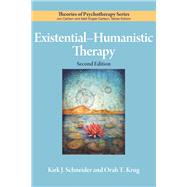- ISBN: 9781433827372 | 1433827379
- Cover: Paperback
- Copyright: 6/19/2017
This second edition provides an updated introduction to the theory, history, research, and practice of existential-humanistic therapy, which merges existential philosophy with humanistic psychotherapy, along with recent trends in existential-integrative therapy.
Existential-humanistic therapy melds European existential philosophy, which values self-inquiry, struggle, and responsibility, with the American tradition of spontaneity, optimism, and practicality. In this updated edition of their popular book, Kirk Schneider and Orah Krug demonstrate how this unique approach can help clients free themselves from self-imposed limitations and develop a deeper understanding of their authentic life goals by cultivating skills such as experiential reflection.
Schneider and Krug explore existential-humanistic therapy’s theoretical and historical underpinnings, its empirical foundations, the therapeutic process and mechanisms of change, as well as future developments. Detailed case examples vividly illustrate the work of existential-humanistic therapy, highlighting key takeaways that are equally accessible and valuable to graduate students and veteran practitioners.
New to this second edition is an increased focus on a more integrative perspective, which makes existential-humanistic therapy applicable to a wider array of settings and diagnostic populations. This flexibility also makes it more adaptable to other therapeutic approaches and expands its influence on clinical psychology as a whole.
Existential-humanistic therapy melds European existential philosophy, which values self-inquiry, struggle, and responsibility, with the American tradition of spontaneity, optimism, and practicality. In this updated edition of their popular book, Kirk Schneider and Orah Krug demonstrate how this unique approach can help clients free themselves from self-imposed limitations and develop a deeper understanding of their authentic life goals by cultivating skills such as experiential reflection.
Schneider and Krug explore existential-humanistic therapy’s theoretical and historical underpinnings, its empirical foundations, the therapeutic process and mechanisms of change, as well as future developments. Detailed case examples vividly illustrate the work of existential-humanistic therapy, highlighting key takeaways that are equally accessible and valuable to graduate students and veteran practitioners.
New to this second edition is an increased focus on a more integrative perspective, which makes existential-humanistic therapy applicable to a wider array of settings and diagnostic populations. This flexibility also makes it more adaptable to other therapeutic approaches and expands its influence on clinical psychology as a whole.







